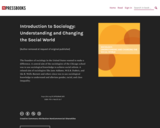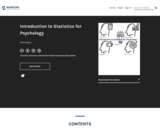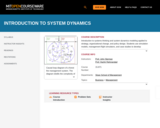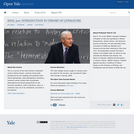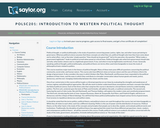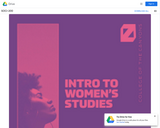
Short Description:
Introduction to Sociology adheres to the scope and sequence of a typical introductory sociology course. In addition to comprehensive coverage of core concepts, foundational scholars, and emerging theories, we have incorporated section reviews with engaging questions, discussions that help students apply the sociological imagination, and features that draw learners into the discipline in meaningful ways. Although this text can be modified and reorganized to suit your needs, the standard version is organized so that topics are introduced conceptually, with relevant, everyday experiences.
Long Description:
Introduction to Sociology adheres to the scope and sequence of a typical introductory sociology course. In addition to comprehensive coverage of core concepts, foundational scholars, and emerging theories, we have incorporated section reviews with engaging questions, discussions that help students apply the sociological imagination, and features that draw learners into the discipline in meaningful ways. Although this text can be modified and reorganized to suit your needs, the standard version is organized so that topics are introduced conceptually, with relevant, everyday experiences.
For the student, this book is based on the teaching and research experience of numerous sociologists. In today’s global socially networked world, the topic of Sociology is more relevant than ever before. We hope that through this book, students will learn how simple, everyday human actions and interactions can change the world. In this book, you will find applications of Sociology concepts that are relevant, current, and balanced.
For instructors, this text is intended for a one-semester introductory course and includes these features: Sociological Research: Highlights specific current and relevant research studies. Sociology in the Real World: Ties chapter content to student life and discusses sociology in terms of the everyday. Big Picture: Features present sociological concepts at a national or international level. Case Study: Describes real-life people whose experiences relate to chapter content. Social Policy and Debate: Discusses political issues that relate to chapter content. Section Summaries distill the information in each section for both students and instructors down to key, concise points addressed in the section. Key Terms are bold and are followed by a definition in context. Definitions of key terms are also listed in the Key Terms, which appears at the end of each chapter. Section Quizzes provide opportunities to apply and test the information students learn throughout each section. Both multiple-choice and short-response questions feature a variety of question types and range of difficulty. Further Research: This feature helps students further explore the section topic and offers related research topics that could be explored.
Word Count: 386746
(Note: This resource's metadata has been created automatically by reformatting and/or combining the information that the author initially provided as part of a bulk import process.)
- Subject:
- Social Science
- Sociology
- Material Type:
- Textbook
- Date Added:
- 01/26/2024


